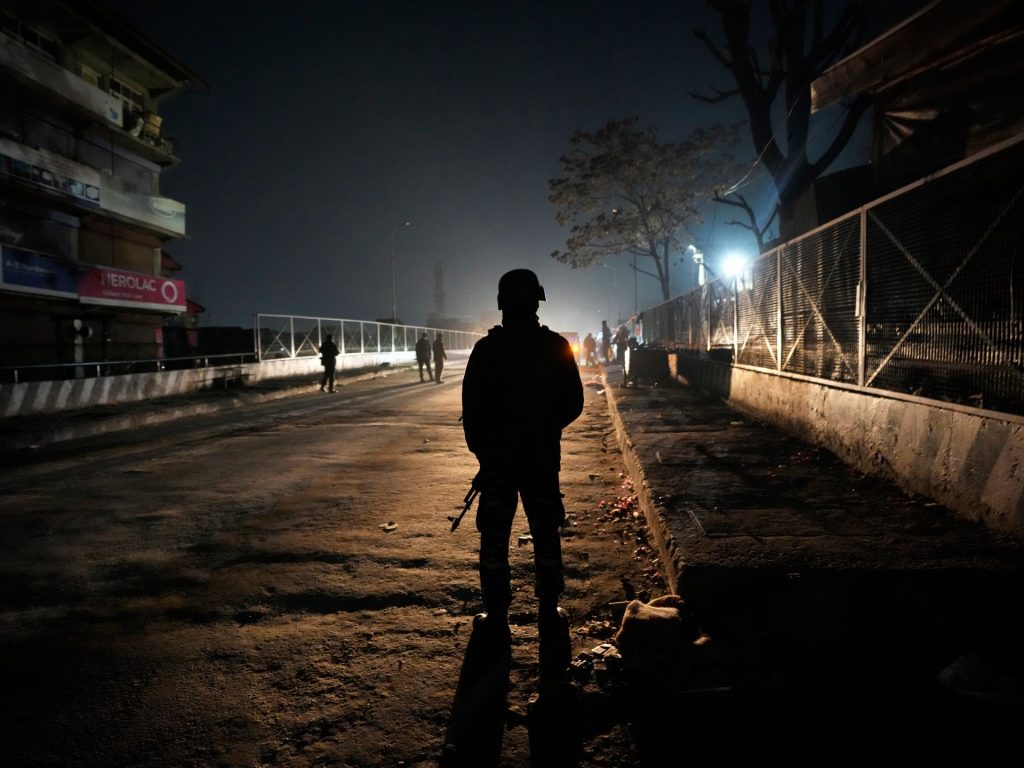Srinagar, Indian-administered Kashmir – Makhan Din stands inside an empty mosque in Indian-administered Kashmir’s Kathua district to record his last video message on a mobile phone.
Wearing a skullcap and a blue-and-white sports jacket, the bearded 25-year-old says he is about to “sacrifice” his life so that no one else in the region is subjected to “torture” by the police, who suspected him of “being associated with militants”, the term authorities use for rebels fighting against the Indian rule.
In the middle of the grainy four-minute video recorded on February 5, Din is seen picking a copy of the Quran from a shelf at his back and putting it on his head to pledge he had “never seen” any rebels as he recounts the horrors he endured in police custody the night before. He then places the holy book back, his lips constantly praying to God.
“I will die so that other people will be saved after me. Oh Allah, accept my sacrifice. Keep my family happy, always, Oh Allah. Save me from the punishment of the grave … You watch everything … Send angels to take my soul from inside the mosque. Please forgive me,” he says as he switches off the phone camera.
In a statement on February 7, police claimed Din had a “number of suspicious contacts in Pakistan and other foreign countries”, and denied he was tortured in custody or had any injury on his body. “He was questioned and then got exposed, went home, and committed suicide,” it said. The Jammu district administration is investigating Din’s death by suicide and allegations of torture.
Meanwhile, Din’s video message had reached tens of thousands of mobile phones and TV screens in and outside the region, heightening tensions and bringing back memories of torture and other atrocities in the scenic Himalayan valley, where an armed rebellion has been going on for decades.
Since independence from British rule and partition into a Hindu-majority India and mainly Muslim Pakistan in 1947, the entire Kashmir territory has been claimed by both the nations who rule over parts of it. The two nuclear powers have fought three full-scale wars over the territory and have positioned tens of thousands of soldiers across its snowy frontier.
India accuses Pakistan of training and financing the rebellion on the Indian side, a charge denied by Islamabad, which says it only provides diplomatic support to the movement on international platforms. New Delhi has deployed more than 500,000 soldiers in Kashmir, making it one of the most militarised regions in the world, where the Indian forces have been given special powers and impunity to crush the rebellion.
Residents say New Delhi’s grip over the region has tightened since 2019, when Prime Minister Narendra Modi’s right-wing government revoked Article 370 of the Indian constitution – which granted a degree of autonomy to Indian-administered Kashmir – and divided the region into two federally-governed union territories – Jammu and Kashmir, and Ladakh. The government claimed the move would bring “normalcy”, peace and development to the region, as it pushed a series of laws and policies Kashmiris fear are aimed at altering the demography of the Muslim-majority region.
The 2019 move was also accompanied by a months-long security lockdown and a ban on public protests, as thousands of people – students, lawyers, activists, and even pro-India politicians – were thrown into jails. More than five years later, however, peace continues to elude the restive streets of the region.
But Din’s alleged torture by the police followed by his death has worsened the fear among residents. “It was scary to see a man resort to killing himself, despite knowing the gravity of the punishment. Our religion [Islam] warns us strongly against the act,” a 22-year-old man said, requesting anonymity as he feared reprisal for speaking to the media.
The young man said Din’s desperate act “made him question the certainty he holds onto”.
“I feel privileged for not being able to imagine the pain he must have gone through. Cases like his are rarely talked about here. Most news is short-lived these days. Times have changed in Kashmir,” he said. “It’s the beginning of the end, really.”
Army kills truck driver
A day after Din took his own life, Waseem Ahmad Mir, a 32-year-old truck driver belonging to northern Kashmir’s Sopore district, was killed by the army.
In a statement, the army said Mir had jumped a security checkpoint on the Srinagar-Baramulla highway. The truck didn’t stop “despite repeated warnings”, it said, further claiming that Mir’s vehicle was chased for 23km (14 miles) before he was shot.
However, Mir’s family rejected the army’s version of events.
“The army says they chased him for 23km, but the [superintendent of police] told us he was chased for 35km. We also want to know that when he had to go to Srinagar, why was the vehicle in the [opposite] direction, going to Baramulla?” Mir’s cousin told the Indian Express newspaper, alleging contradictions in the statements made by the army and the police.
“His clothes were in the dirt. We want to know if they had beaten or tortured him before the killing.”
‘A lot of fear’
The deaths of the two civilians due to alleged excesses by the Indian forces came as more than 500 Kashmiris were detained for the killing of a retired army officer, Manzoor Ahmad Wagay, a local resident, on February 3. Wagay was shot dead by suspected rebels, and his wife and niece injured in south Kashmir’s Kulgam.
Following the killing, authorities rounded up young men from several districts in south Kashmir, most of them earlier charged with participating in anti-government protests or the armed rebellion. Photos of the armed forces frisking vehicles and people at various checkpoints went viral on social media.
“I am feeling scared after the recent crackdown because it seems like we can no longer live in our own Kashmir, or if we do, it has to be in constant fear. You never know when the army might come and take you away, and then you suffer despite being innocent,” a 21-year-old from Pulwama district told Al Jazeera, requesting anonymity.
“There is a lot of fear here,” he said, adding that many young men received calls from army camps, “summoning” them. He said it was “terrifying”.
“On top of that, there’s family pressure; our families get scared. When someone steps out of the house, there’s no certainty if they will return,” he said. “If we want to continue living here, we must be prepared to leave the moment they summon us.”
Al Jazeera reached out to several people who were recently detained or questioned, but they feared “consequences” if they talked to the media.
“I don’t know how I was let go. My mind is free right now and if I talk, I will live in one more fear and anxiety: of being caught because I spoke to you,” said one of them.
Habeel Iqbal, a lawyer from south Kashmir’s Shopian district, said the police can detain someone on reasonable suspicions, but that detention cannot exceed 24 hours, within which the suspect should be produced before a court and have the grounds of his arrest explained to him and his relatives informed about it.
“To detain around 500 people, as the reports suggest, for investigation seems to be a case of abuse of law and a case of police overreach. We have often seen the various protections and rights available to the detainees being violated by investigative agencies,” he told Al Jazeera.
Ram Puniyani, a Mumbai-based writer and activist, said the police cannot detain such a large amount of people on mere suspicion. “There must be some legal aspect of it that they are not following. This is a clear-cut human rights violation,” he told Al Jazeera.
‘Our blood is not cheap’
The mass detentions and the deaths of the two civilians have also outraged regional politicians, who have questioned New Delhi’s claims of a “return of normalcy” after 2019.
“My concern is that the police flout the very rule of law they are supposed to uphold and protect these people, that it somehow becomes so devious that the people are scared of them, and not the militants. It is a very warped system,” Iltija Mufti of the Peoples Democratic Party (PDP) told Al Jazeera as she visited Kathua to meet Din’s family.
Calling the recent incidents “highly unfortunate”, regional Chief Minister Omar Abdullah – elected in October last year in the region’s first assembly elections in a decade – said he has taken up the matter with New Delhi and “insisted that both incidents are inquired into in a time-bound, transparent manner”.
“The regional government will also order its own inquiries,” he added. However, in the post-2019 Kashmir, the powers of the chief minister over police have been drastically curtailed as the department is directly controlled by the federal government.
Altaf Thakur, spokesman for Modi’s Bharatiya Janata Party (BJP) in Kashmir, told Al Jazeera his party wants to form a high-level committee to investigate the deaths of the two civilians, and “perpetrators to be punished”.
“If an innocent person is killed, whether he is from Kathua or somewhere else, it cannot be tolerated,” he said.
Aakar Patel, chair of the Amnesty International rights group in India, told Al Jazeera the Indian government has “no interest in the human rights of Kashmiris”.
“It has not responded to or responded negatively to every single chargesheet filed by [regional] police against armed forces personnel since 1989. It has never ever withdrawn the immunity of anyone under AFSPA protection,” he said, referring to the Armed Forces Special Powers Act, a draconian Indian law that grants its soldiers impunity against legal ramifications of their acts in the region.
Patel said there should be a reconsideration of “policies in place since 1989”, which have seen the Kashmiri population as the “enemy”.
During a speech in the Indian parliament in New Delhi last week, Kashmiri parliamentarian Sheikh Abdul Rashid condemned the deaths of Mir and Din and demanded an independent probe into them.
“Our blood is not cheap,” he said. “We also have the right to live.”








